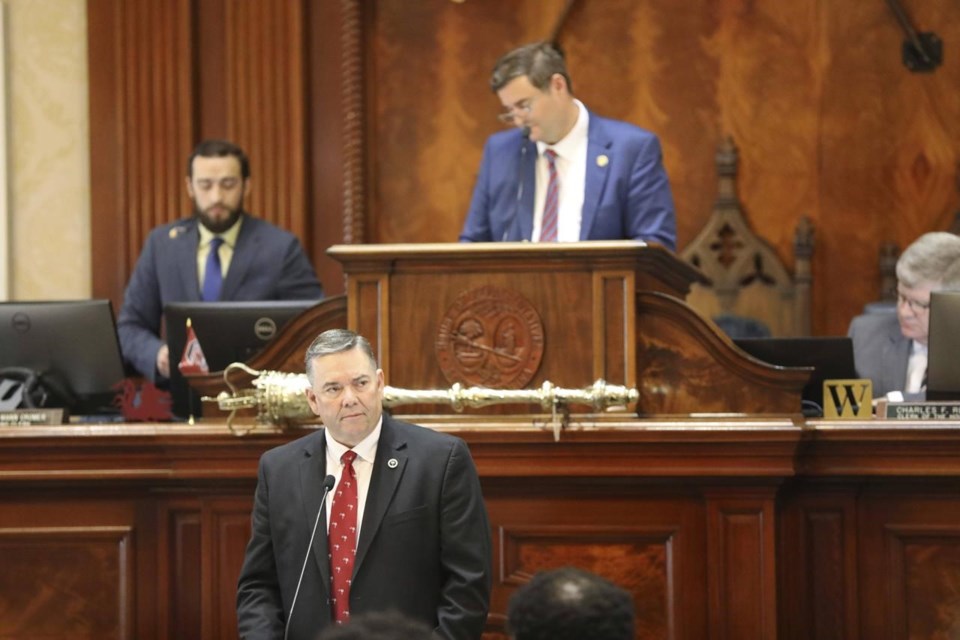COLUMBIA, S.C. (AP) — While the have shaken some Republicans' appetite for additional restrictions, South Carolina lawmakers on Wednesday advanced a .
By a 67-35 vote, the South Carolina House sent the Senate a bill banning abortion with exceptions only when the pregnancy risks the mother’s health or up to 12 weeks when it is the result of rape or incest.
But much of the landscape has changed since South Carolina Gov. Henry McMaster signed the state’s temporarily blocked ban around six weeks at the presence of cardiac activity. Now, members of a state Republican Party divided on the issue’s details are no longer constrained by federal law.
Conservative lawmakers have been emboldened to pursue further restrictions since the U.S. Supreme Court overturned Roe v. Wade. But factions within the party were made plain Tuesday when Republican leadership called a nearly two-hour recess to convene members before the House ultimately passed an abortion ban with limited exceptions.
“We knew that we were all over the place,” Republican Rep. Davey Hiott said Tuesday evening of the caucus meeting. “If I told you it was pleasant in there I’d be lying to you.”
“We have no idea what the Senate will do,” Hiott, the House majority leader, added. “Our goal was to get a bill over there that we were comfortable with.”
Those shifting fault lines will determine whether the upper chamber follows suit or carves out a new proposal when lawmakers convene next week.
At a Monday news conference, Republican Sen. Richard Cash and Rep. Stewart Jones said they represented a “growing consensus” that would not commit to voting for a proposal that included exceptions outside of protections for a mother's life.
But that faction ultimately lost in the House when Republicans -- by a voice vote -- added exceptions for pregnancies up to 12 weeks caused by rape or incest. Jones did not vote on the bill's final passage. While Cash's uncompromising position is backed by Republican Sens. Danny Verdin and Rex Rice, whether other colleagues support him remains to be seen.
Charleston Republican Sandy Senn said she would vote against any proposal that bans abortion before the first trimester ends and lacks exceptions for rape, incest, a mother’s life and fetal anomaly.
“Most people in our state would support such a reasonable bill, and I believe most of my colleagues internally would too. Some senators will feel the heat of the party base to vote a certain way,” Senn said in an email. “I don’t because that base is in the minority even within our party.”
Republican Sen. Katrina Shealy -- who represents Lexington County, one of the state’s more conservative districts -- said the chances are “slim to none” that the Senate passes the House version.
According to Shealy, enough Republican Senators want to see how the state’s “heartbeat bill” pans out before taking additional action.
“I wish (the House) hadn’t sent us anything and left it alone,” Shealy said. “We had a good bill. Leave it like it is.”
Democratic Sen. Marlon Kimpson -- who in 2018 filibustered a bill that would have outlawed most abortions -- is not optimistic he can repeat that success. Since then, procedural rule changes and the loss of several moderate Republican voices have made it less likely he will successfully block any proposal. Plus, Kimpson said the remaining moderate members are less comfortable voicing opposition out of increased fears they might lose their next primary.
To defeat any new restrictions, Democrats will have to find eight Republicans to join their ranks -- a “challenging” task, according to Kimpson.
“At the end of the day it’s about numbers. And the game is set in favor of the party whose controlled both houses and the governor’s offices for almost two decades or more," Kimpson said. "It’s going to an uphill battle.”
With the House advancing its proposal, lawmakers on both sides of the aisle are looking ahead to January's regular session. Democrats on Wednesday asked when the legislature will better fund the foster care system, increase SNAP benefits, and expand Medicaid, among other policies. Republicans on Monday mentioned a planned bill to streamline the adoption process.
Having exhausted their options for dissent in the legislature, House Democrats also repeatedly urged abortion rights supporters to vote for pro-choice candidates this fall.
At a demonstration Tuesday before the final House vote, activists asked supporters to continue calling their elected officials. Melissa Moore, the director of organizing for Women’s Rights and Empowerment Network, said the ballot box can’t be the only response because gerrymandered districts have limited its effectiveness as a tool for change.
Moore named Rep. Neal Collins, who two weeks ago in a moment that went viral, got choked up at a meeting as he described the impact of the six-week abortion ban he supported. While Collins abstained from moving the proposal out of committee, he ultimately voted for the final bill.
“We have to pull weeds and plant seeds,” Moore told protesters Tuesday.
James Pollard, The Associated Press



